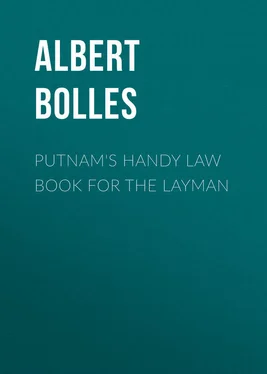Albert Bolles - Putnam's Handy Law Book for the Layman
Здесь есть возможность читать онлайн «Albert Bolles - Putnam's Handy Law Book for the Layman» — ознакомительный отрывок электронной книги совершенно бесплатно, а после прочтения отрывка купить полную версию. В некоторых случаях можно слушать аудио, скачать через торрент в формате fb2 и присутствует краткое содержание. Издательство: Иностранный паблик, Жанр: foreign_antique, foreign_prose, на английском языке. Описание произведения, (предисловие) а так же отзывы посетителей доступны на портале библиотеки ЛибКат.
- Название:Putnam's Handy Law Book for the Layman
- Автор:
- Издательство:Иностранный паблик
- Жанр:
- Год:неизвестен
- ISBN:нет данных
- Рейтинг книги:5 / 5. Голосов: 1
-
Избранное:Добавить в избранное
- Отзывы:
-
Ваша оценка:
- 100
- 1
- 2
- 3
- 4
- 5
Putnam's Handy Law Book for the Layman: краткое содержание, описание и аннотация
Предлагаем к чтению аннотацию, описание, краткое содержание или предисловие (зависит от того, что написал сам автор книги «Putnam's Handy Law Book for the Layman»). Если вы не нашли необходимую информацию о книге — напишите в комментариях, мы постараемся отыскать её.
Putnam's Handy Law Book for the Layman — читать онлайн ознакомительный отрывок
Ниже представлен текст книги, разбитый по страницам. Система сохранения места последней прочитанной страницы, позволяет с удобством читать онлайн бесплатно книгу «Putnam's Handy Law Book for the Layman», без необходимости каждый раз заново искать на чём Вы остановились. Поставьте закладку, и сможете в любой момент перейти на страницу, на которой закончили чтение.
Интервал:
Закладка:
The rights of travelers along intersecting streets are equal, and each must exercise ordinary care to avoid injury to the other. An automobilist nearing an intersection should run at proper speed, have his car under reasonable control, and along the right-hand side of the street. If two travelers approach the street crossing at the same time neither is justified in assuming that the other will stop to let him pass. When one vehicle reaches the intersection directly in advance of the other, he is generally accorded the right of way, and the other should delay his progress to enable the other to pass in safety.
The driver of an automobile may be charged with negligence if, without warning to a vehicle approaching from the rear, he turns or backs his machine and causes a collision. Indeed, it is negligence for a chauffeur to back his machine on a city street or public highway without looking backward; and especially if one backs his car on a street car track without looking for street cars.
If an obstruction exists on the right-hand side of a highway, the driver of a car may be justified in passing to the other side, and in driving along that side until he has passed the obstacle. Under such circumstances he has a right to be on the left side temporarily; and if he exercises the proper degree of care while there, is not liable for injuries arising from a collision with another traveler. But if the obstruction is merely temporary, it may be the duty of the driver to wait for the removal and not to pass on the wrong side of the highway.
An automobilist must exercise reasonable or ordinary care to avoid injury to other persons using the highway. What this is depends on many circumstances, and each case to some extent is decided by its own facts. Consequently thousands of cases have already arisen, and doubtless they will still multiply as long as automobiles are used and their users are negligent.
The competency of the driver is one of the unending questions. Of course he should be physically fit, not subject to sudden attacks of dizziness, possessing sufficient strength and proper eyesight and a sober non-excitable disposition. It is said, that a chauffeur is not incompetent who requires glasses. But he certainly would be if his eyesight was poor and could not be aided by the use of them.
The driver must at all times have his car under reasonable control so that he can stop in time to avoid injury. He must keep a reasonably careful lookout for other travelers in order to avoid collision; also for defects in the highway. If by reason of weather conditions, lights or other obstructions, he is unable to see ahead of him, he should stop his car. If there be no facilities for stopping for the night, a driver is not negligent should he proceed through the fog.
Passing to the liability of the owner of a car for the acts of his chauffeur, the general rule is, he is then liable when the chauffeur is acting within the scope of his owner's business. When the owner himself is riding in the car there is less difficulty in fixing the liability, but when the chauffeur uses the car without the owner's consent, he is not liable for the conduct of the driver. And this is especially so in using a car contrary to the owner's instructions and for the chauffeur's pleasure; or in using it for his own business with the owner's consent. And the same rule generally prevails whenever a member of a family uses his parent's car without his knowledge and consent, and especially when forbidden. But the parent is liable for the running of a car with his knowledge by a member of his family and for the convenience or pleasure of other members. See Chauffeur ; Garage Keeper .
Bailor and Bailee.– To create this relation the property must be delivered to the bailee. Though a minor cannot make such a contract, yet if property comes into his possession he must exercise proper care of it. Should he hire a horse and kill the animal by rash driving, he would be liable for its value. A corporation may act as bailor or bailee, and an agent acting therefor would render the corporation liable unless he acted beyond the scope of his authority.
Suppose one picks up a pocketbook, does he become the owner? Is he a bailee? Yes, and must make an honest, intelligent effort to find the owner; if failing to do so, then he may retain it as his own, meanwhile his right as finder is perfect as against all others. Should the true owner appear, whatever right the finder may have against him for recompense for the care and expense in keeping and preserving the property, his status as finder does not give him any lien unless the owner has offered a reward to whoever will restore the property. To this extent a lien thereon is thereby created.
The statutes generally provide what a person must do who has found lost property. Suppose a person appears who claims to be the owner of the thing found, what shall the finder do in the way of submitting it to his inspection? In one of the recent cases the court decided that it was a question of fact and not of law whether the finder of lost property had given a fair and reasonable opportunity for its identification before restoring it, and whether the claimant should have been given an opportunity to inspect it in order to decide whether it belonged to him.
The finder does not take title to every article found and out of the possession of its true owner. To have even a qualified ownership the thing must be lost, and this does not happen unless possession has been lost casually and involuntarily so that the mind has no recourse to the event. A thing voluntarily laid down and forgotten is not lost within the meaning of the rule giving the finder title to lost property; and the owner of a shop, bank or other place where the thing has been left is the proper custodian rather than the person who was the discoverer.
If a lost article is found on the surface of the ground, or the floor of a shop, in the public parlor of a hotel, or near a table at an open-air place of amusement, or in the car of a railroad it becomes, except as against the loser, the property of the finder, who appropriates it regardless of the place where it was found. Once a boat was found adrift and the finder made the needful repairs to keep it from sinking, yet the owner was mean enough to refuse to pay for them. The court compelled him to make good the amount to the finder.
The law regards the possession of an article which is lost as being that of the legal owner who was previously in possession, until the article is taken into the actual possession of the finder. If the finder does not know who the owner is and there is no clue to the ownership, there is no larceny although the finder takes the goods for himself and converts them to his own use. If the finder knows who the owner is or has a reasonable clue to the ownership, which he disregards, he is guilty of larceny.
Another class of cases must be noticed. Very often articles are delivered to another to have work done on them, hides to be tanned, or raw materials to be worked up into fabrics. Can a creditor of the bailee pounce on tanned hides or completed fabrics as belonging to him and take them in satisfaction of his debt? Both parties have in truth an interest in the goods, and in general it may be said that the bailor cannot thus be deprived of his interest and may follow the goods and recover them or their value.
If they are destroyed while executing the agreement, who must lose? If the bailee is not negligent or otherwise at fault, and the loss happened by internal defect or inevitable accident, the bailor would be the loser. And if workmen had been employed thereon, the bailor would also be obligated to pay for their labor.
To what extent can a bailee limit his liability by agreement? A bailee who was a cold storage keeper, stated in his receipt "all damage to property is at the owner's risk." This limitation related, so a court decided, to loss resulting from the nature of the things stored. A bailee received some cheese and gave a receipt slating that it was to be kept at the owner's risk of loss from water. It was injured from the dripping of water from overhead pipes. The bailee was, notwithstanding his receipt, held liable.
Читать дальшеИнтервал:
Закладка:
Похожие книги на «Putnam's Handy Law Book for the Layman»
Представляем Вашему вниманию похожие книги на «Putnam's Handy Law Book for the Layman» списком для выбора. Мы отобрали схожую по названию и смыслу литературу в надежде предоставить читателям больше вариантов отыскать новые, интересные, ещё непрочитанные произведения.
Обсуждение, отзывы о книге «Putnam's Handy Law Book for the Layman» и просто собственные мнения читателей. Оставьте ваши комментарии, напишите, что Вы думаете о произведении, его смысле или главных героях. Укажите что конкретно понравилось, а что нет, и почему Вы так считаете.












